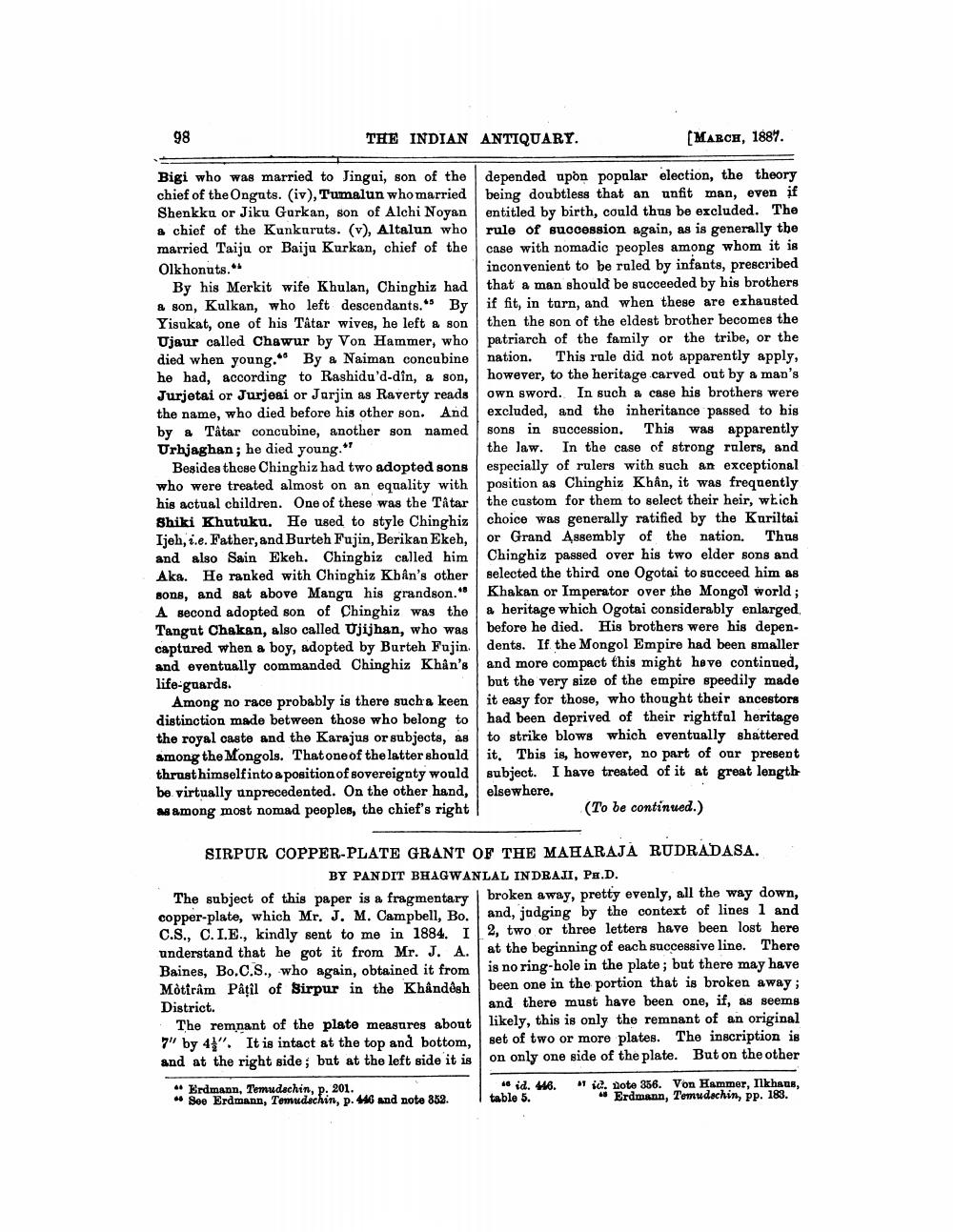________________
98
THE INDIAN ANTIQUARY.
(MARCH, 1887.
Bigi who was married to Jingui, son of the depended upon popular election, the theory chief of the Onguts. (iv), Tumalun who married being doubtless that an unfit man, even if Shenkku or Jiku Garkan, son of Alchi Noyan entitled by birth, could thus be excluded. The 1 chief of the Kunkuruts. (v), Altalun who rule of succession again, as is generally the married Taiju or Baiju Kurkan, chief of the case with nomadic peoples among whom it is Olkhonuts."
inconvenient to be ruled by infants, prescribed By his Merkit wife Khulan, Chinghiz had that a man should be succeeded by his brothers & son, Kulkan, who left descendants. By if fit, in turn, and when these are exhausted Yisukat, one of his Tåtar wives, he left a son then the son of the eldest brother becomes the Ujaur called Chawur by Von Hammer, who patriarch of the family or the tribe, or the died when young." By & Naiman concubine nation. This rule did not apparently apply, he had, according to Rashidu'd-din, a son, however, to the heritage carved out by a man's Jurjetai or Jurjeai or Jarjin as Raverty reads own sword. In such a case his brothers were the name, who died before his other son. And excluded, and the inheritance passed to his by a Tatar concubine, another son named sons in succession. This was apparently Urhjaghan; he died young."
the law. In the case of strong rulers, and Besides those Chinghiz had two adopted sons especially of rulers with such an exceptional who were treated almost on an equality with position as Chinghiz Khân, it was frequently his actual children. One of these was the Tatar the custom for them to select their heir, which Shiki Khutuku. He used to style Chinghiz choice was generally ratified by the Kuriltai Ijeh, i.e. Father, and Burteh Fujin, Berikan Ekeh, or Grand Assembly of the nation. Thus and also Sain Ekeh. Chingbiz called him Chinghiz passed over his two elder sons and Aka. He ranked with Chinghiz Khân's other selected the third one Ogotai to succeed him as Bons, and sat above Mangu his grandson." Khakan or Imperator over the Mongol world; A second adopted son of Chinghiz was the a heritage which Ogotai considerably enlarged, Tangut Chakan, also called Ujijhan, who was before he died. His brothers were his depen. captured when a boy, adopted by Burteh Fujin dents. If the Mongol Empire had been smaller and eventually commanded Chinghiz Khan's and more compact this might have continued, life-guards.
but the very size of the empire speedily made Among no race probably is there such a keen it easy for those, who thought their ancestors distinction made between those who belong to had been deprived of their rightfal heritage the royal caste and the Karajus or subjects, as to strike blows which eventually shattered among the Mongols. Thatone of the latter should it. This is, however, no part of our present thrust himself into a position of sovereignty would subject. I have treated of it at great length be virtually unprecedented. On the other hand, elsewhere. Mamong most nomad peoples, the chief's right
(To be continued.)
SIRPUR COPPER-PLATE GRANT OF THE MAHARAJA RUDRADASA.
BY PANDIT BHAGWANLAL INDRAJI, PH.D. The subject of this paper is a fragmentary broken away, pretty evenly, all the way down, copper-plate, which Mr. J. M. Campbell, Bo. and, judging by the context of lines 1 and C.S., C.I.E., kindly sent to me in 1884. I 2, two or three letters have been lost here understand that he got it from Mr. J. A. at the beginning of each successive line. There Baines, Bo.C.S., who again, obtained it from is no ring-hole in the plate; but there may have Môtiram Pațil of Sirpur in the Khandesh
been one in the portion that is broken away; District.
and there must have been one, if, as seems The remnant of the plate measures about likely, this is only the remnant of an original 7" by 4". It is intact at the top and bottom, set of two or more plates. The inscription is and at the right side; but at the left side it is on only one side of the plate. But on the other Erdmann, Temudachin, p. 201...
id. 6. 12. note 356. Von Hammer, Ilkhaus, * Soo Erdmann, Temudschin, p. 146 and note 852 table 5.




